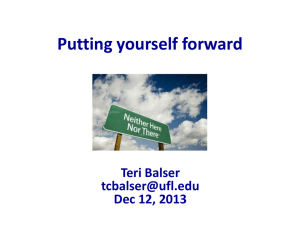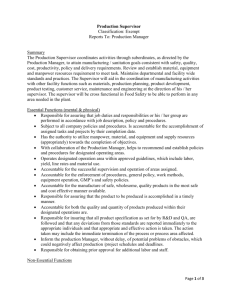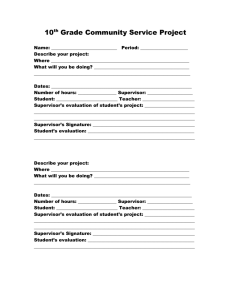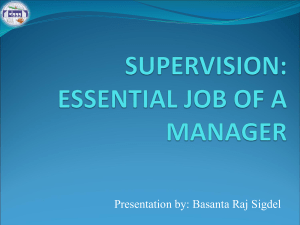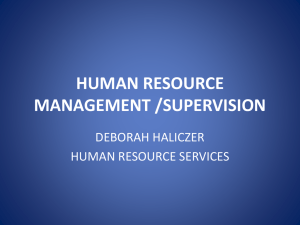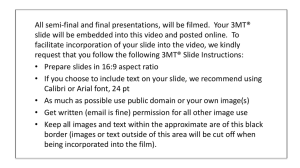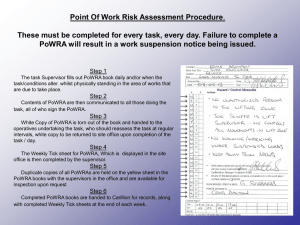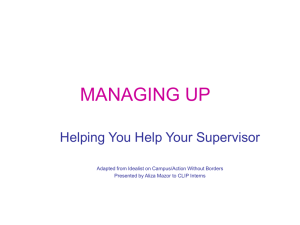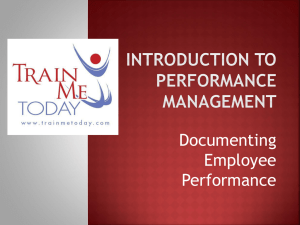Leadership Lessons Learned - Code 3 Fire Training & Education
advertisement
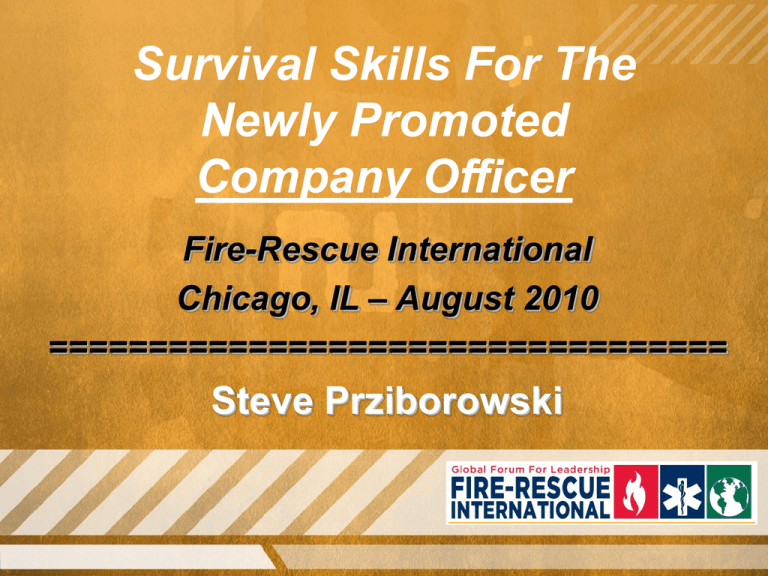
Survival Skills For The Newly Promoted Company Officer Fire-Rescue International Chicago, IL – August 2010 ================================== Steve Prziborowski Objectives: • Define the role of the company officer of TODAY • Identify how the role & responsibility of the company officer has changed over the years Objectives: • Identify various survival skills to utilize to make you a better company officer • Create an action plan for success as a current or future company officer How has the role and responsibility of a company officer changed over the last 20 to 40 years? What to expect after getting promoted: • • • • • • You will probably have a probationary period You may have a project to complete You will be evaluated You will be under the microscope You will be tested continuously You will make decisions daily that could have serious long-term effects on your trust, credibility, and long-term success, among other things…… Why is the position of company officer one of the most challenging positions? Company Officer Most challenging position: • • • • You’re typically the first supervisor on scene You’re representing the F.D. You’re representing the Fire Chief You’re the conduit between the line personnel and administration • You’re acting in the best interest of the public (our bosses) Crew Member or Supervisor – Which will you be???? Before Getting Promoted: • Really take a deep look at the daily life of a company officer – or the expectations of a company officer today – this may not be the job for you after all……. • Realize you are no longer going to be “one of the guys or gals” – you are the supervisor – and you’re expected to SUPERVISE! Before & After Getting Promoted: • Start preparing for the position, long before the promotion • Carefully select your mentors / role models • Determine how you will act as a company officer This may mean getting your act cleaned up now! • Be prepared to hit the ground running Before & After Getting Promoted: • Keep a low profile (when necessary) • Remember you’re being watched • Learn as much as you can about your department, your community, your personnel • Remember that one poor choice or inappropriate comment (via either oral or written communications) may doom you……. Info to be very familiar with: • • • • • • Department rules & regulations Department MOU / MOA Department policies & procedures Federal/State/Local laws relating to your job Probationary Firefighter Text Book Strategy/Tactics, Fire Behavior & Building Construction (the big three!!!) Personnel Expectations: • Either you set the stage for your personnel….or they will set it for you! • I encourage you to create your own to discuss with your crew • Ensure they are realistic, measurable, obtainable, legal, ethical, within the expectations of your administration, etc. Personnel Expectations: • Do not forget to ask your crew what they expect of you! It’s a two-way street! • Now that you have shared your expectations Make sure you hold your personnel accountable for their actions or non-actions! Decision Making – “The Headline Test” • Most importantly - make decisions! • Utilize the “Headline Test” when possible: 1. Is it the right thing for the department? 2. Is it the right thing for our personnel? 3. Is it the right thing for our community? 4. Would you mind reading about it in the morning newspaper? If you can answer yes to all four - GO FOR IT!!! Training: • • • • • A minimum of two hours per day Make every opportunity to train Be creative, know what you’re teaching Empower your personnel, don’t be the only instructor Don’t rely on the Department Training Officer to provide you with all the tools to train you’re personnel - you are a TO! Subject areas to be familiar with: • • • • • • • • Management Fire Investigation Fire Prevention Fire Command Public Education Instructional Techniques ICS Progressive Discipline • • • • • • • • Technical Rescue Leadership Supervision Time management Planning skills Organization skills Delegation Mentoring Subject areas to be familiar with: • Report writing • Communications: - Non-verbal, Oral, Written • Public speaking • Team building • Problem solving • Decision making • Facility maintenance • • • • • • • Apparatus maintenance Training Risk management Motivation Safety Construction trades Mechanical ability Continuing Education: • • • • • • If you think the previous information was too much, maybe reconsider being an officer….. Complete your two year or four degree Attend at least one conference per year Attend at least two seminars per year If you are going to train your personnel daily, you better know what you’re doing!!! Subscribe to /read fire service publications Time Management • • • • • One of the biggest problems facing society and the fire service today Learn time management skills 10, 14, 24 hours per day you’re getting paid for Telling your supervisor “I didn’t get to it is unacceptable” Make things happen, be proactive/creative Buddy to Boss: • • • • Don’t forget where you came from…..but don’t forget you’re now getting paid to be a supervisor! Very tough for many folks to do Your job is not to selectively enforce the rules and regulations Be firm, fair and impartial, and do your job! Leadership Lessons Learned 1. Learn from the good and the not-so-good of others. 2. Always prepare yourself for at least one position ahead of the one you are currently in, testing for or aspiring to. 3. Give personnel the benefit of the doubt. Leadership Lessons Learned 4. Prepare to manage the incident LONG BEFORE the incident actually occurs. 5. Prepare to manage the personnel problem LONG BEFORE the situation occurs. 6. Don’t jump to conclusions; your first impression may not be correct. Leadership Lessons Learned 7. Be prepared to filter information provided to you to get to the actual problem. 8. Make everyone feel like a valued team member. 9. Be honest with people / have integrity. Leadership Lessons Learned 10.Remember that Rome wasn’t conquered in a day. 11.Get to know the strengths & weaknesses of ALL of your personnel ASAP. 12.Be loyal to those above, below and around you, including the customers you serve. Leadership Lessons Learned 13.99.5% of your personnel will not need to be “constantly watched;” the other 0.5% will need to be guided & directed very specifically if you desire certain results. 14.Constantly provide mentoring opportunities for your personnel. Leadership Lessons Learned 15.Remember that the majority (if not all) of your success as a leader will be based on your relationships. 16.Learn to manage stress / keep composure. 17.Practice management by rationality as opposed to management by emotions. Leadership Lessons Learned 18.Before canceling (or downgrading) incoming, additional resources, be quite sure you don’t need them. 19.Before requesting additional resources, be quite sure you don’t need them. 20.Lead by example. Leadership Lessons Learned 21.Balance administrative duties with personnel time. 22.Take input from as many as you can prior to coming to a final decision on certain items. 23.Yes, we all want to be “liked,” but instead how about striving for respect & credibility? Leadership Lessons Learned 24.Leadership is having others come to a similar final decision, but by them thinking that they came to the decision on their own and without you shoving it down their throat. 25.Before attempting to “change the world,” learn as much history about the issues as you can. Leadership Lessons Learned 26. You can agree to disagree, but before coming to that decision, make sure you know where the other person/group is coming from. 27. Always try to give credit where credit is due, even if it means others “may look better than you.” Leadership Lessons Learned 28. Realize there are numerous leadership styles. 29. Everything you say is gospel. 30. Trust others until they’ve burned you twice. 31. Admit mistakes, poor choices or decisions. Leadership Lessons Learned 32. Be open to feedback & constructive criticism from all around. 33. Take responsibility & accountability for what happens or doesn’t happen. 34. CHAOS doesn’t stand for “Captain” or “Chief” has arrived on scene! Leadership Lessons Learned 35. When someone doesn’t live up to your expectations, does something inappropriate or just plain stupid, before jumping down their throat, consider the following: Did you ever tell them they couldn’t do that? Did you ever set expectations on performance? If so, did you ever hold them accountable or turn a blind eye? Did you expect too much? Leadership Lessons Learned 36. Be humble. 37. Encourage risk. 38. Take ownership / demonstrate commitment. 39. Be dependable & consistent. Leadership Lessons Learned 40. Have a sense of humor / have fun! 41. Sometimes peer pressure can be the best fix to a problem. 42. Have a vision. Leadership Lessons Learned 43. Be an expert in something. 44. Be the one who believes the glass is half full. 45. Be passionate about the fire service, your department, your personnel and of course, your family! Leadership Lessons Learned 46. Get yourself & your personnel out of the comfort zone every now & then. 47. Opportunity knocks when you least expect it; be prepared to take advantage of it! Leadership Lessons Learned 48. Let unimportant controversies die a natural death. 49. Sometimes you have to step back to step forward. 50. The customer is not always right….but they are always the customer! Closing Thoughts: • • • • • • Set expectations Hold your personnel accountable Lead by example Enforce the rules and regulations Do not tolerate inappropriate behavior, incompetence, or mediocrity Keep your supervisor in the loop but don’t dump decisions on their plate (there is a difference) Closing Thoughts: • • • • • • Practice Management-By-Walking-Around Praise in public, coach/counsel in private Take care of your personnel Have a daily plan, every day Start every shift with a roll call/meeting Do a transfer of command briefing every morning Closing Thoughts: • Come up with solutions, not problems • Prepare each of your personnel to do your job (now and in the future) • Empower and delegate tasks to your personnel • If you won’t be the designated adult – who will? Questions????? Thank you very much for your time! CONTACT INFORMATION: Steve Prziborowski 408-205-9006 sprziborowski@aol.com www.code3firetraining.com www.chabotfire.com
